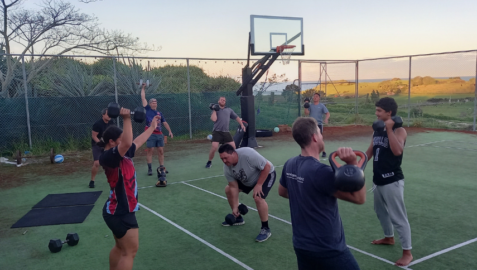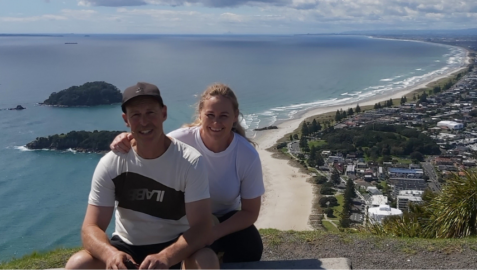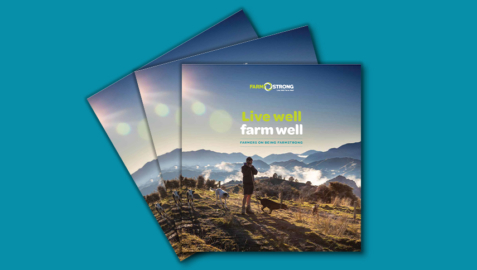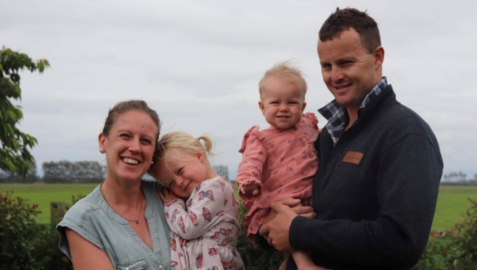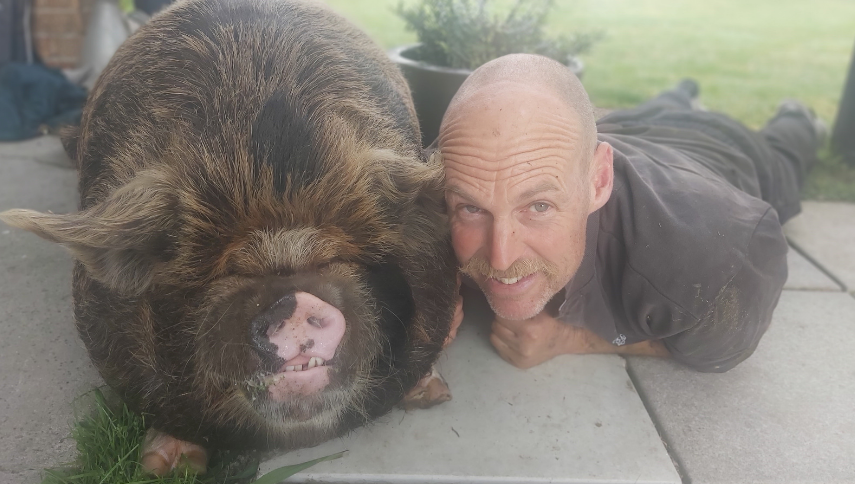
Taking Off The Blinkers
Module Overview
Paul Walker runs a 300-cow, 90-hectare dairy farm in Pongakawa, just south of Te Puke, in the Bay of Plenty. He discusses the difference Farmstrong has made to his farming.
How did you get into farming?
I was brought up on farm. We’re third generation farmers. We’ve been here since the early 1950s. I ran around the house playing rugby as a youngster, then went to Christchurch for ten years and spent some time in the corporate world. But the attraction of being self-employed and raising a family on farm was big. A farm is the most impressive office space you can have. I was just under 30, came home and took up farming as a business.
What do you like about it?
One of major pros to farming is that you can see a lot more of your family. That’s a big plus for me. I also love working with animals, being on the land and contributing to this community.
How’s the season been going for you so far?
Good. Autumn’s one of my favourite times of the year. The thing that usually worries us the most, the weather, has been playing ball. That’s usually the biggest stress in our industry. It’s something you can’t control and it impacts you heavily. I have a lot of empathy for farmers in other regions where there’s been flooding or it’s really dry.
How has your approach to farming changed over the years?
When I first got into farming, I had this vision of working as hard as possible then getting out the other end and enjoying life. I had the blinkers on the whole time – my life was just about trying to get the job done so I could enjoy this fantastic retirement. The big problem with that is that you don’t enjoy life and farming as you’re going along!
What was the impact on your wellbeing?
It led to some pretty ‘black holes’ I had to deal with. Where you literally can’t see the light at the end of the tunnel and you’re missing out on so much, like seeing your kids grow up. I was just too busy rushing to get things done. And let’s face it, there’s always something you could be doing in farming. You could quite easily fill 24 hours a day, every day if you wanted to.
You’re quite isolated on farm too. You can easily get stuck in your own bubble where the only people nearby are your family and, unfortunately, they often bear the brunt of your negativity and negative thoughts. That’s not a healthy or productive space to be in.
What changed your thinking?
I ran across one Farmstrong’s healthy thinking workshops run by Dr Tom Mulholland. That was the moment for me. The penny just dropped that I had to learn to manage what was under my feet every day and slow down and enjoy life, otherwise before I knew it, it’d be gone.
What did you change?
The thing that really connected me with Farmstrong was a video I watched about how stress works. They used the example of a one litre bottle. Every time something went wrong on farm, it filled it up the bottle until there was no space left and it overflowed. That’s how stress works – there’s no space left in your bottle to cope any more. That really helped me explain how I was feeling to my friends and family. It was like a huge weight lifted off my shoulders. After that, I was hooked and I dived into other Farmstrong resources.
What’s your approach now?
There’s a really cool Farmstrong idea called the wellbeing bank account. You make regular ‘investments’ by doing things that increase your wellbeing and that helps you to deal with the ‘withdrawals’ like adverse weather events or when things get really demanding on farm.
What are your investments?
Mine are exercise, catching up with mates, enjoying the simple things in life and giving back to my community. So, if I’m going for a run or going to play social cricket on a Tuesday night, I’m increasing my wellbeing which means I’ll have plenty of ‘coping space’ left in the bottle to deal with whatever happens on farm.
Does it work?
Yes, there’s a whole science behind this. The research shows things like connecting with mates, or even just taking the time when you’re following the cows in the morning to look up at the stars for twenty seconds and enjoy the moment, can really boost your mood. I never used to do those things, but they make a big difference to how you feel.
What other skills have you picked up?
There are thinking strategies I use to manage unexpected setbacks on farm. Instead of just reacting instantly to something, I take a step back and give myself time to think about a situation and then respond. If you respond to something rather than react, you’re going to get a much more positive outcome.
I’ve also picked up skills on how to have a listening conversation with people doing it tough. That was an eye opener for me. Like a lot of farmers, I wasn’t the best listener. I was always trying to leap in and solve everyone’s problems. But people have their own solutions and ideas. I’ve trained myself to shut up and actually listen.
Any other tips for keeping well on farm?
Yes, make sure you look after the basics – eat properly, get enough sleep and exercise. I’ve learnt the hard way that if the ‘hardware’ isn’t working properly, then your ‘software’ doesn’t function well either. If I haven’t got the basics in place, I can stand there for far longer than normal in a paddock trying to figure out where to put up a fence, because it’s harder to make decisions.
What are the main challenges for you on farm at the moment?
Your vulnerability is constantly being tested in farming. You’re making crucial decisions every day – making sure your animals are fed and watered, planning feed requirements in the light of recent global events, managing staff under Covid protocols. Sometimes it feels like there’s a thousand decisions being made in the space of a couple of hours.
We’ve just invested heavily in an effluent system only to discover it has sunk, so we’re having to take down a majority of it and redo it. This will come at significant cost but that’s something that’s out of our control, so we’ll just absorb it and carry on. Being Farmstrong doesn’t mean something like that’s not going to stress you, but it gives you tools and strategies to combat the stress.
How would you sum up the difference Farmstrong makes?
I think the big picture is that it helps you pause, take a step back and answer your ‘why’ – why are you farming in the first place? It also provides practical, day-to-day help. Farmstrong’s all about prevention. I do work for the Rural Support Trust helping people who are doing it tough. I think being Farmstrong reduces your chances of getting into a position where you have no choice but to seek extra assistance to get back on track.
Unfortunately, a lot of people don’t find out their capacity to cope with setbacks until something hits them. But if you, or those around you, can recognise the signs, you can do something about it.
There are Farmstrong resources that will help you enjoy the industry that you’re in and create a much positive environment for your family and your staff.
Do you think many farmers are open to these ideas?
Yes, we just held a dairy discussion group here and for the first time we focused on wellbeing. We were a little bit nervous at first, but people weren’t hesitant at all to talk. It’s no longer a taboo subject, it’s actually top of mind for many people.
Let’s face it, before you start buying the tractors and the motorbikes, you’ve got to have the right tools to look after yourself, otherwise none of that other stuff is going to matter.
Farmstrong is a nationwide, rural wellbeing programme that helps people manage the ups and downs of farming and growing. To find out what works for you and lock it in, visit w ww.farmstrong.co.nz
